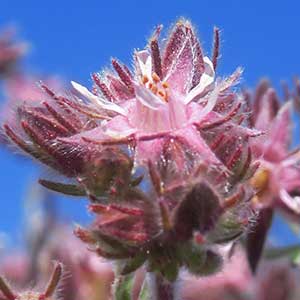Horkelia parryi
Horkelia hendersonii
chamise horkelia, Parry horkelia, Parry's horkelia
Henderson's horkelia
ascending to erect, 1–3(–3.5) dm.
ascending to erect, 0.8–2(–2.5) dm.
4–10(–12) × 1–2 cm;
leaflets 3–6(or 7) per side, narrowly obovate, 5–12(–15) × 4–8(–10) mm, 1/2–3/4 as wide as long, divided ± 1/4 to midrib into 5–10 oblong to broadly obovate teeth, sparsely pilose especially on midveins and margins.
3–8 × 0.7–1.5 cm;
leaflets (5 or)6–12 per side, overlapping at least distally, cuneate to flabellate, 4–9(–10) mm, divided 1/2+ to midrib into 3–6 oblanceolate to obovate lobes (often medially notched more than 3/4 to midrib as well), silky villous.
1–4.
2–3.
(3–)5–15 mm.
2–8(–10) mm.
15 mm diam.;
epicalyx bractlets linear-lanceolate to narrowly elliptic, 2–5 × 0.5–1.5 mm, ± 2/3 length of sepals;
hypanthium 0.6–1 × 2.5–4 mm, less than 1/3 as deep as wide;
sepals ± spreading to reflexed, lanceolate to narrowly elliptic, 3.5–6 mm;
petals elliptic to obovate, 4–7 × 3 mm, apex obtuse to rounded to truncate or slightly emarginate;
filaments 1–3 × 0.6–1.3 mm, anthers 0.6–1 mm;
carpels (17–)20–50;
styles 1.5–2.5 mm.
(2–)4–15(–20), 10 mm diam.;
epicalyx bractlets linear, 2.5–4.5 × 0.2–0.5 mm, 2/3 to nearly equal to length of sepals;
hypanthium 1–2.5 × (2–)3–4(–5) mm, ± 1/2 as deep as wide, interior densely villous;
sepals spreading, narrowly lanceolate, 3.5–6 mm, silky hairs silky, 1–1.5 mm;
petals often pink-tinged, linear to narrowly oblanceolate, 2.5–5 × 1 mm, apex ± acute to narrowly rounded, sometimes slightly mucronate;
filaments pinkish, 2 × 0.5–0.7 mm, glabrous or sparsely pilose adaxially, anthers 0.5–0.7 mm;
carpels 8–17;
styles (1.5–)2–3 mm.
grayish, 1.3–1.5 mm, finely reticulate.
dark brown, 2 mm.
= 28.
Horkelia parryi
Horkelia hendersonii
Of conservation concern.
Horkelia parryi is known from the foothills of the western Sierra Nevada in Amador, Calaveras, and El Dorado counties, and is disjunct in Mariposa County.
(Discussion copyrighted by Flora of North America; reprinted with permission.)
Of conservation concern.
Horkelia hendersonii is one of the more attractive species of the genus, with its grayish mats and dusky pink inflorescences. P. A. Rydberg (1898) placed it initially in his group Capitatae, here restricted to H. fusca, and later (1908c) transferred it to his new group Tenuilobae, which otherwise comprised only H. tenuiloba. The species is known only from Jackson County, Oregon, and an isolated population in adjacent Siskiyou County, California. The populations are vulnerable due to their proximity to popular recreational sites.
(Discussion copyrighted by Flora of North America; reprinted with permission.)
